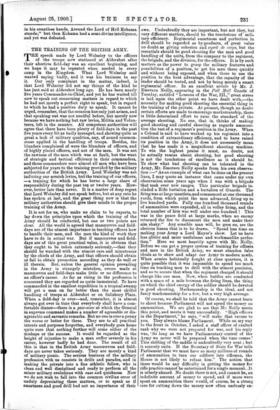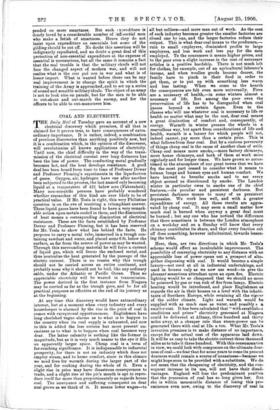THE TRAINING OF THE BRITISH ARMY. T HE speech made by
Lord Wolseley to the officers of the troops now stationed at Aldershot after their abortive field-day was an excellent beginning, and we hope it may be repeated when needed in every camp in the Kingdom. What Lord Wolseley said wanted saying badly, and it was his business to say it. Our only complaint in the matter, indeed, is that Lord Wolseley did not say things of the kind be has just said at Aldershot long ago. He has been nearly five years Commander-in-Chief, and yet he has waited till now to speak out concerning matters in regard to which he had not merely a perfect right to speak, but in regard to which he had a positive duty to speak. It cannot be urged, remember, that the occasion has only just arisen, and that speaking out was not needful before, but merely now because we have nothing but raw levies, Militia and Volun- teers, left in the country. All competent authorities will agree that there have been plenty of field-days in the past five years every bit as badly managed, and showing quite as great a lack of military qualities, nay, of sound common- sense applied in the handling of troops. Besides, the blunders complained of were the blunders of officers, and of highly placed officers, and not of the men. It was not the rawness of the men which was at fault, but the want of strategic and tactical efficiency in their commanders, and those commanders were almost all men who have been subjected for years to the training provided by the military authorities of the British Army. Lord Wolseley was not indicting our scratch levies, but the training of our officers, —a training for which he has borne a large share of responsibility during the past ten or twelve years. How- ever, better late than never. It is a matter of deep regret that Lord Wolseley did not speak before, but at any rate he has spoken at last, and the great thing now is that the military authorities should give their minds to the proper training of the Army.
It is not for us, who make no claim to be experts, to lay down the principles upon which the training of the Army should be conducted, but one or two points are clear. All the world is agreed that manceuvres and field- days are of the utmost importance in teaching officers how to handle their men, and the men the kind of work they have to do in actual war. But if manceuvres and field- days are of this great practical value, it is obvious that they ought to be taken extremely seriously,—that they should be watched with the utmost care and minuteness by the chiefs of the Army, and that officers should obtain or fail to obtain promotion according as they do well or ill therein. But, unless the general opinion prevailing in the Army is strangely mistaken, errors made at manceuvres and field-days make little or no difference to an officer's career. As far as rising in the profession is concerned they are regarded as quite immaterial. To have commanded in the smallest expedition in a tropical swamp will get a man on far better than the most skilful handling of troops at Aldershot or on Salisbury Plain. When a field-day is over—and, remember, it is almost always got over in time that everybody shall have a com- fortable dinner—there is a pow-wow at which the General in supreme command makes a number of agreeable or dis- agreeable and sarcastic remarks. But no one is ever a penny the worse or better for these. They are to all practical intents and purposes forgotten, and everybody goes home quite sure that nothing further will come either of the mishaps or the success. It would be regarded as the height of injustice to make a man suffer severely in his career, however badly he had done. The result of all this is that in the British Army manceuvres and field- days are never taken seriously. They are merely a kind of military picnic. The serious business of the military profession with us consists in drills and parades, and in making the private into a fine athletic fellow, who is clean and well disciplined and ready to perform all the minor military evolutions with ease and quickness. Now we do not wish to fall into the common civilian error of unduly depreciating these matters, or to speak as if smartness and good drill had not an importance of their own. Undoubtedly they are important, but not they, but very different matters, should be the touchstone of mili- tary efficiency. Regimental smartness and perfection in drill should be regarded as by-products, of great value no doubt as giving cohesion and esprit do corps, but the essentials should be good shooting for the men and good handling of the units, from the company to the regiment, the brigade, and the division, for the officers. It is by such matters as the power to grasp the military features and possibilities of a position, to get his men there quickly and without being exposed, and when there to use the position to the best advantage, that the capacity of the leader should be tested, and not by being merely a smart regimental officer. In an excellent article by Mr. J. Emerson Neilly, appearing in the Pall Hall Gazette of Tuesday, entitled "Lessons of the War, great stress is laid upon the other point we have dealt with,—the necessity for making good shooting the essential thing in the training of the private. At present, though no doubt certain efforts are made to encourage marksmanship, there is little determined effort to raise the standard of the average shooting. No one, that is, thinks of making good shooting and careful shooting as regards ammuni- tion the test of a regiment's position in the Army. When a Colonel is said to have worked up his regiment into a condition of extraordinary efficiency, and to have raised its position in the Army, it does not necessarily mean that he has made it a magnificent shooting machine. To win the highest praise it must, no doubt, not be actually remiss about shooting, but good shooting is not the touchstone of excellence as it should be. To show what bad shooting can be tolerated in the Army, Mr. Emerson Neilly speaks from his own observa- tion :—" As an example of what can be done on the present lines, I may quote an instance that came under my own observation some years ago when I was with a brigade that took over new ranges. This particular brigade in- cluded a Rifle battalion and a battalion of Guards. The firing was at large mantlets,and commenced at one thousand yards, from which point the men advanced, firing up to five hundred yards. Fully one hundred thousand rounds of ammunition were expended, all in volley firing, and the total number of hits was well under one hundred ! This was in the peace field at large marks, when no enemy returned the fire to disconcert the men and make their aim shaky." Any sensible man will, he goes on, see the obvious lesson that is to be drawn. " Spend less time on making your Army a Lord Mayor's show. Let us have less glitter and more usefulness and workmanlike perfec- tion." Here we most heartily agree with Mr. Neilly. Before we can get a proper system of training for officers and men in the British Army, we must abandon false ideals as to show and adapt our Army to modern needs. When armies habitually fought at close quarters, it is quite possible that it was impossible to spend too much time on teaching men to drill with the utmost precision, and so to secure that when the regiment charged it should charge like one man. Now, when battles are conducted with a space of a mile between the firing lines, the thing on which the chief energy of the soldier should be devoted is good shooting. Marksmanship is the ideal, and not fancy marksmanship for a few, but a very high average.
Of course, we shall be told that the Army cannot learn to shoot because Parliament will not spend the money ou ammunition. We are glad to see that Mr. Neilly meets this point, and meets it very successfully. "High officers in the Department," he says, " will make that excuse to you. They always blame Parliament. While on my way to the front in October, I asked a staff officer of exalted rank why we were not prepared for war, and his reply was, So long as we have Parliamentary control of the Army we never will be prepared when the time comes.' This shifting of the saddle is undoubtedly very neat ; but it scarcely suits. If the Secretary of State for War tells Parliament that we must have so many millions of rounds of ammunition to turn our soldiers into riflemen, the House is not likely to refuse him." The notion that there would be any difficulty in getting the money for rifle practice cannot be entertained for a single moment. it is utterly absurd. No doubt there is not, and cannot be, an indefinite amount of money to spend, and if more were spent on ammunition there would, of course, be a strong case for cutting down the money now often uselessly ex- pended on mere smartness. But such e xpenditure is dearly loved by a considerable number of influential men who make a fetish of smartness. Hence they do not insist upon expenditure on essentials lest some of the gilding should be cut off. No doubt this assertion will be indignantly repudiated, and no doubt a great deal of this protection of non-essential expenditure at the expense of essential is unconscious, but all the same it remains a fact that the real trouble is that the military chiefs will not face the changed aspect of modem war, and will not realise what is the sine qud non in war and what is of lesser import. What is wanted before there can be any real improvement is to change the spirit in which the training of the Army is approached, and to set up a series of sound and sensible military ideals. The object of an army is not to look nice on parade, but for the men to be able to out-shoot and out-march the enemy, and for the officers to be able to out-manoeuvre him.



































 Previous page
Previous page